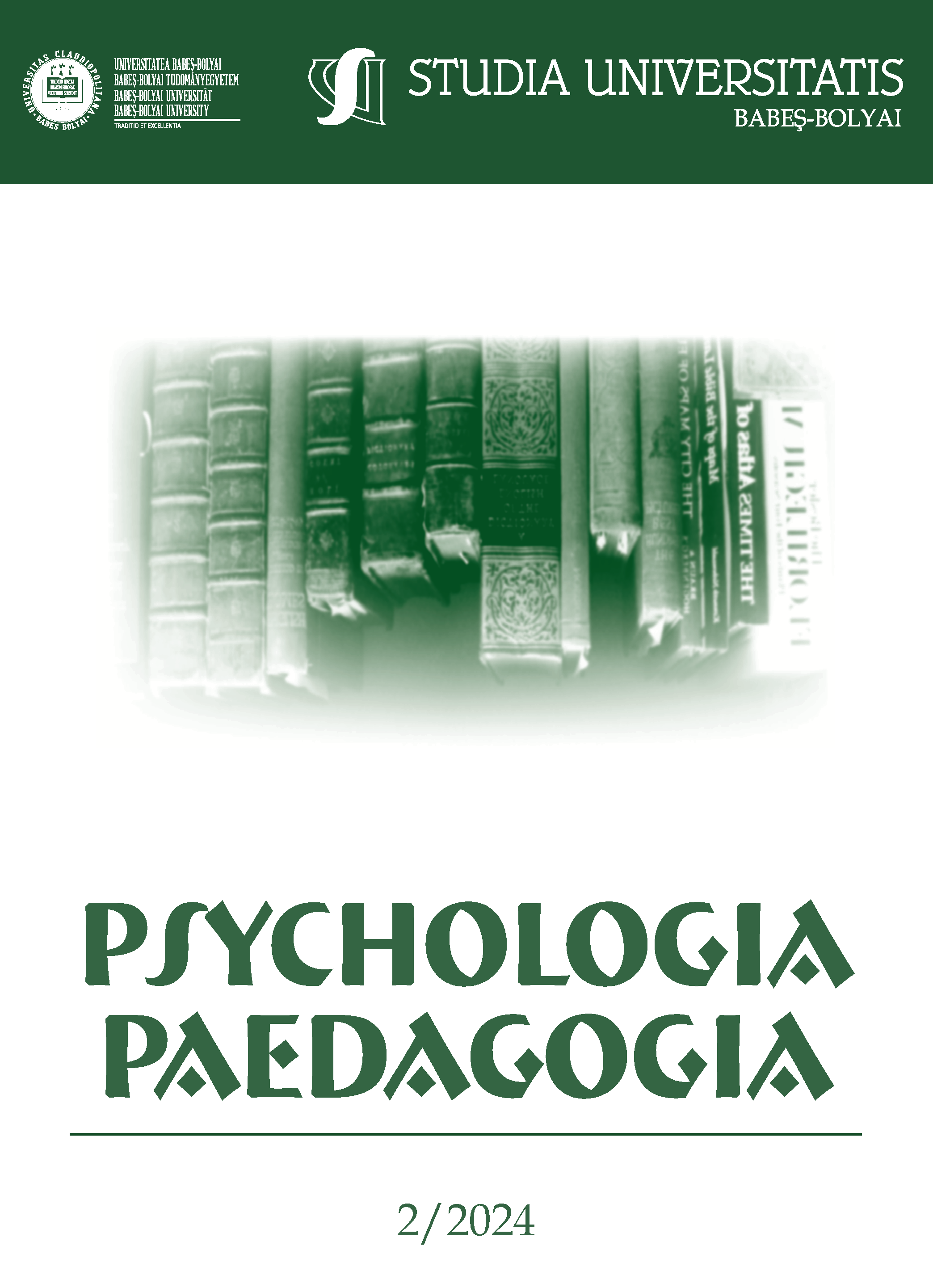Civic Engagement in Times of Crisis: How did Romanian Emerging Adults Engage?
DOI:
https://doi.org/10.24193/subbpsyped.2024.2.02Keywords:
community engagement, civic engagement, Eastern Europe, emerging adulthood, COVID-19Abstract
The COVID-19 pandemic created a unique context in which community engagement was necessary for handling the crisis and emerging adults had a reduced risk in the face of the virus. Therefore, this paper aimed to take an in-depth look at the ways in which emerging adults engaged in their communities. Inductive thematic analyses conducted on a sample of 86 Romanian emerging adults (Mage= 23.38, SDage= 2.71) revealed two main themes: General engagement (subthemes Passing on knowledge, Helping disadvantaged groups, Organizing events, and Political engagement), and Pandemic-related engagement (subthemes Initiatives directly related to the COVID-19 virus, and Initiatives related to the wider impact of the COVID-19 pandemic). Results show that most Romanian emerging adults engaged in activities not directly related to handling the crisis and identify one worryingly unpopular form of engagement: political engagement.
References
Arnett, J. J. (2011). Emerging adulthood(s). The cultural psychology of a new life stage. InL. J. Arnett (Ed.), Bridging cultural and developmental approaches to psychology. New syntheses in theory, research, and policy (pp. 255-275). New York: Oxford University Press.
Braun, V., & Clarke, V. (2006). Using thematic analysis in psychology. Qualitative Research in Psychology, 3(2), 77–101. https://doi.org/10.1191/1478088706qp063oa
Dragan, A., & Popa, N. (2017). Social Economy in Post-communist Romania: What Kind of Volunteering for What Type of NGOs? Journal of Balkan and Near Eastern Studies, 19(3), 330-350. https://doi.org/10.1080/19448953.2017.1277088
Ekman, J., Gherghina, S., & Podolian, O. (2016). Challenges and realities of political participation and civic engagement in central and eastern Europe. East European Politics, 32(1), 1-11. https://doi.org/10.1080/21599165.2016.1141091
Ekzayez, A., Al-Khalil, M., Jasiem, M., Al Saleh, R., Alzoubi, Z., Meagher, K., & Patel, P. (2020). COVID-19 response in northwest Syria: innovation and community engagement in a complex conflict. Journal of Public Health, 42(3), 504-509. https://doi.org/10.1093/pubmed/fdaa068
Gray, D., Randell, J., Manning, R., & Cleveland, M. (2024). Helping in times of crisis: Examining the social identity and wellbeing impacts of volunteering during COVID‐19. Journal of Community & Applied Social Psychology, 34(1), e2699. https://doi.org/10.1002/casp.2699
Kim, S., Chee, K. H., & Gerhart, O. (2017). Redefining generativity: Through life course and pragmatist lenses. Sociology Compass, 11(11), e12533. https://doi.org/10.1111/soc4.12533
Koc-Michalska, K., Lilleker, D., Baden, C., Guzek, D., Bene, M., Doroshenko, L., Gregor, M., & Scoric, M. (2024). Digital media, democracy and civil society in Central and Eastern Europe. Journal of Information Technology & Politics, 21(1), 1-5. https://doi.org/10.1080/19331681.2023.2257012
Kostelka, F. (2014). The state of political participation in post-communist democracies: Low but surprisingly little biased citizen engagement. In The State of Democracy in Central and Eastern Europe (pp. 105-128). Routledge. https://doi.org/10.1080/09668136.2014.905386
Jones, M., Beardmore, A., Biddle, M., Gibson, A., Ismail, S. U., McClean, S., & White, J. (2020). Apart but not Alone? A cross-sectional study of neighbour support in a major UK urban area during the COVID-19 lockdown. Emerald Open Research, 1(2). https://doi.org/10.35241/emeraldopenres.13731.1
Lannegrand-Willems, L., Chevrier, B., Perchec, C., & Carrizales, A. (2018). How is civic engagement related to personal identity and social identity in late adolescents and emerging adults? A person-oriented approach. Journal of Youth and Adolescence, 47, 731-748. https://doi.org/10.1007/s10964-018-0821-x
Laverack, G., & Manoncourt, E. (2016). Key experiences of community engagement and social mobilization in the Ebola response. Global Health Promotion, 23(1), 79-82. https://doi.org/10.1177/1757975915606674
Levine, M., Prosser, A., Evans, D., & Reicher, S. (2005). Identity and emergency intervention: How social group membership and inclusiveness of group boundaries shape helping behavior. Personality and Social Psychology Bulletin, 31(4), 443-453. https://doi.org/10.1177/0146167204271651
McAdams, D. P., & de St Aubin, E. D. (1992). A theory of generativity and its assessment through self-report, behavioral acts, and narrative themes in autobiography. Journal Of Personality and Social Psychology, 62(6), 1003. https://doi.org/10.1037/0022-3514.62.6.1003
Mărcău, F. C., Gheorghițoiu, R., & Bărbăcioru, I. C. (2022). Survey upon the reasons of COVID-19 vaccination acceptance in Romania. Vaccines, 10(10), 1679. https://doi.org/10.3390/vaccines10101679
Marinica, B. V., & Negru-Subtirica, O. (2023). Civic engagement during times of crisis: Personal motivations of Romanian adults at the onset of the war in Ukraine. Cognition, Brain, Behavior, 27(2). https://doi.org/10.24193/cbb.2023.27.10
Mao, G., Fernandes-Jesus, M., Ntontis, E., & Drury, J. (2021). What have we learned about COVID-19 volunteering in the UK? A rapid review of the literature. BMC Public Health, 21, 1-15. https://doi.org/10.1186/s12889-021-11390-8
Romanian National Youth Council (2020). Why did the youth (not) vote?. Retrieved March 1, 2024, from https://ctr.ro/?p=73286
Romanian Permanent Electoral Authority. (2020). Voter Turnout Statistics for the 2020 Parliamentary Elections. Retrieved March 1,2024, from https://prezenta.roaep.ro/parlamentare06122020/romania-counties
Simsa, R., Rameder, P., Aghamanoukjan, A., & Totter, M. (2019). Spontaneous volunteering in social crises: Self-organization and coordination. Nonprofit and Voluntary Sector Quarterly, 48 103S-122S. https://doi.org/10.1177/0899764018785472
Voicu, B., Bartolome Peral, E., Rusu, H., Rosta, G., Comşa, M., Vasile, O. M., Coromina, L., & Tufis, C. (2021). COVID-19 and orientations towards solidarity: the cases of Spain, Hungary, and Romania. European Societies, 23(sup1), S887-S904. https://doi.org/10.1080/14616696.2020.1852439
Wray-Lake, L., Arruda, E. H., & Schulenberg, J. E. (2020). Civic development across the transition to adulthood in a national US sample: Variations by race/ethnicity, parent education, and gender. Developmental Psychology, 56(10), 1948. https://doi.org/10.1037/dev0001101
Yazdani, N., Hoyt, L. T., Maker Castro, E., & Cohen, A. K. (2022). Sociopolitical influences in early emerging adult college students’ pandemic-related civic engagement. Emerging Adulthood, 10(4), 1041-1047. https://doi.org/10.1177/21676968221098296
Yum, Y. O., & Schenck-Hamlin, W. (2005). Reactions to 9/11 as a function of terror management and perspective taking. The Journal of Social Psychology, 145(3), 265-286. https://doi.org/10.3200/SOCP.145.3.265-286
Zaff, J. F., Kawashima-Ginsberg, K., & Lin, E. S. (2011). Advances in civic engagement research: Issues of civic measures and civic context. Advances in Child Development and Behavior, 41, 273-308. https://doi.org/10.1016/B978-0-12-386492-5.00011-7.
Downloads
Published
How to Cite
Issue
Section
License
Copyright (c) 2024 Studia Universitatis Babeș-Bolyai Psychologia-Paedagogia

This work is licensed under a Creative Commons Attribution-NonCommercial-NoDerivatives 4.0 International License.


